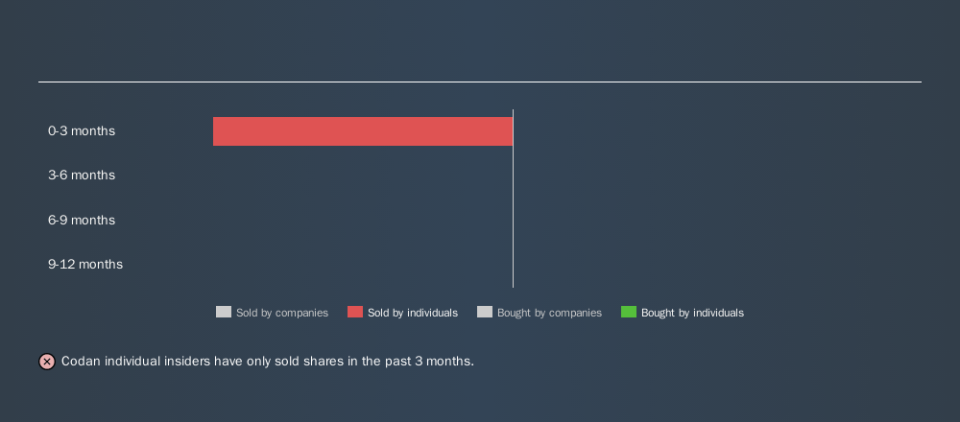Read This Before Buying Codan Limited (ASX:CDA) Shares

It is not uncommon to see companies perform well in the years after insiders buy shares. Unfortunately, there are also plenty of examples of share prices declining precipitously after insiders have sold shares. So shareholders might well want to know whether insiders have been buying or selling shares in Codan Limited (ASX:CDA).
What Is Insider Selling?
Most investors know that it is quite permissible for company leaders, such as directors of the board, to buy and sell stock in the company. However, most countries require that the company discloses such transactions to the market.
We don't think shareholders should simply follow insider transactions. But equally, we would consider it foolish to ignore insider transactions altogether. For example, a Harvard University study found that 'insider purchases earn abnormal returns of more than 6% per year.
Check out our latest analysis for Codan
The Last 12 Months Of Insider Transactions At Codan
Over the last year, we can see that the biggest insider sale was by the insider, Brian Burns, for AU$4.4m worth of shares, at about AU$5.11 per share. So it's clear an insider wanted to take some cash off the table, even below the current price of AU$6.84. When an insider sells below the current price, it suggests that they considered that lower price to be fair. That makes us wonder what they think of the (higher) recent valuation. However, while insider selling is sometimes discouraging, it's only a weak signal. We note that the biggest single sale was only 8.8% of Brian Burns's holding. Brian Burns was the only individual insider to sell over the last year.
You can see the insider transactions (by individuals) over the last year depicted in the chart below. By clicking on the graph below, you can see the precise details of each insider transaction!
I will like Codan better if I see some big insider buys. While we wait, check out this free list of growing companies with considerable, recent, insider buying.
Codan Insiders Are Selling The Stock
Over the last three months, we've seen significant insider selling at Codan. Specifically, insider Brian Burns ditched AU$4.4m worth of shares in that time, and we didn't record any purchases whatsoever. This may suggest that some insiders think that the shares are not cheap.
Insider Ownership of Codan
Another way to test the alignment between the leaders of a company and other shareholders is to look at how many shares they own. I reckon it's a good sign if insiders own a significant number of shares in the company. Codan insiders own 40% of the company, currently worth about AU$497m based on the recent share price. This kind of significant ownership by insiders does generally increase the chance that the company is run in the interest of all shareholders.
So What Do The Codan Insider Transactions Indicate?
An insider hasn't bought Codan stock in the last three months, but there was some selling. Looking to the last twelve months, our data doesn't show any insider buying. But since Codan is profitable and growing, we're not too worried by this. While insiders do own a lot of shares in the company (which is good), our analysis of their transactions doesn't make us feel confident about the company. Therefore, you should should definitely take a look at this FREE report showing analyst forecasts for Codan.
If you would prefer to check out another company -- one with potentially superior financials -- then do not miss this free list of interesting companies, that have HIGH return on equity and low debt.
For the purposes of this article, insiders are those individuals who report their transactions to the relevant regulatory body. We currently account for open market transactions and private dispositions, but not derivative transactions.
We aim to bring you long-term focused research analysis driven by fundamental data. Note that our analysis may not factor in the latest price-sensitive company announcements or qualitative material.
If you spot an error that warrants correction, please contact the editor at editorial-team@simplywallst.com. This article by Simply Wall St is general in nature. It does not constitute a recommendation to buy or sell any stock, and does not take account of your objectives, or your financial situation. Simply Wall St has no position in the stocks mentioned. Thank you for reading.

 Yahoo Finance
Yahoo Finance 
